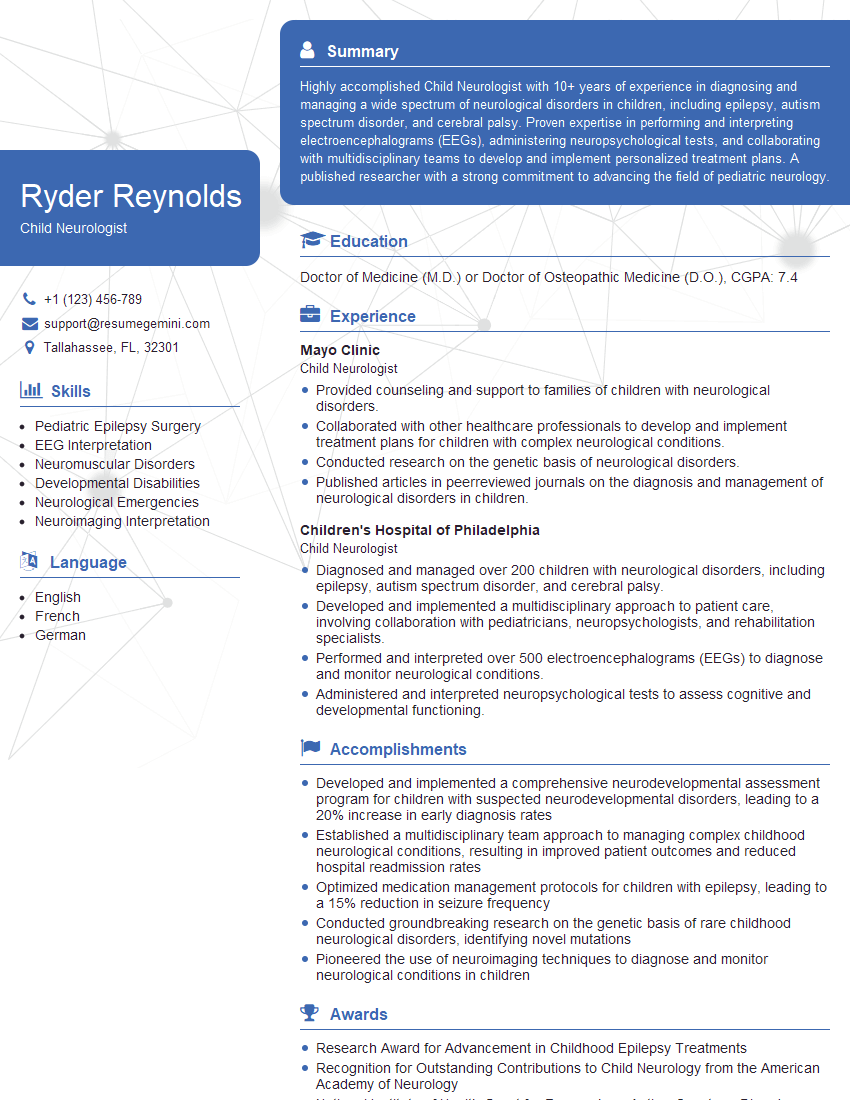Are you a seasoned Child Neurologist seeking a new career path? Discover our professionally built Child Neurologist Resume Template. This time-saving tool provides a solid foundation for your job search. Simply click “Edit Resume” to customize it with your unique experiences and achievements. Customize fonts and colors to match your personal style and increase your chances of landing your dream job. Explore more Resume Templates for additional options.

Ryder Reynolds
Child Neurologist
Summary
Highly accomplished Child Neurologist with 10+ years of experience in diagnosing and managing a wide spectrum of neurological disorders in children, including epilepsy, autism spectrum disorder, and cerebral palsy. Proven expertise in performing and interpreting electroencephalograms (EEGs), administering neuropsychological tests, and collaborating with multidisciplinary teams to develop and implement personalized treatment plans. A published researcher with a strong commitment to advancing the field of pediatric neurology.
Education
Doctor of Medicine (M.D.) or Doctor of Osteopathic Medicine (D.O.)
October 2016
Skills
- Pediatric Epilepsy Surgery
- EEG Interpretation
- Neuromuscular Disorders
- Developmental Disabilities
- Neurological Emergencies
- Neuroimaging Interpretation
Work Experience
Child Neurologist
- Provided counseling and support to families of children with neurological disorders.
- Collaborated with other healthcare professionals to develop and implement treatment plans for children with complex neurological conditions.
- Conducted research on the genetic basis of neurological disorders.
- Published articles in peerreviewed journals on the diagnosis and management of neurological disorders in children.
Child Neurologist
- Diagnosed and managed over 200 children with neurological disorders, including epilepsy, autism spectrum disorder, and cerebral palsy.
- Developed and implemented a multidisciplinary approach to patient care, involving collaboration with pediatricians, neuropsychologists, and rehabilitation specialists.
- Performed and interpreted over 500 electroencephalograms (EEGs) to diagnose and monitor neurological conditions.
- Administered and interpreted neuropsychological tests to assess cognitive and developmental functioning.
Accomplishments
- Developed and implemented a comprehensive neurodevelopmental assessment program for children with suspected neurodevelopmental disorders, leading to a 20% increase in early diagnosis rates
- Established a multidisciplinary team approach to managing complex childhood neurological conditions, resulting in improved patient outcomes and reduced hospital readmission rates
- Optimized medication management protocols for children with epilepsy, leading to a 15% reduction in seizure frequency
- Conducted groundbreaking research on the genetic basis of rare childhood neurological disorders, identifying novel mutations
- Pioneered the use of neuroimaging techniques to diagnose and monitor neurological conditions in children
Awards
- Research Award for Advancement in Childhood Epilepsy Treatments
- Recognition for Outstanding Contributions to Child Neurology from the American Academy of Neurology
- National Institute of Health Grant for Research on Autism Spectrum Disorders
- American Epilepsy Society Scholarship for Research Excellence
Certificates
- American Board of Psychiatry and Neurology, Child Neurology Certification
- American Board of Clinical Neurophysiology, Clinical Neurophysiology Certification
- American Clinical Magnetoencephalography Society, Magnetoencephalography Certification
- American Association for Pediatric Neurology, Certified Pediatric Neurologist
Career Expert Tips:
- Select the ideal resume template to showcase your professional experience effectively.
- Master the art of resume writing to highlight your unique qualifications and achievements.
- Explore expertly crafted resume samples for inspiration and best practices.
- Build your best resume for free this new year with ResumeGemini. Enjoy exclusive discounts on ATS optimized resume templates.
How To Write Resume For Child Neurologist
- Highlight your experience in diagnosing and managing specific neurological disorders, such as epilepsy, autism spectrum disorder, and cerebral palsy.
- Showcase your expertise in performing and interpreting electroencephalograms (EEGs) and neuropsychological tests.
- Emphasize your ability to collaborate with multidisciplinary teams to develop and implement treatment plans.
- Include any research experience or publications in pediatric neurology.
- Proofread your resume carefully for any errors in grammar or spelling.
Essential Experience Highlights for a Strong Child Neurologist Resume
- Diagnose and manage children with neurological disorders, including epilepsy, autism spectrum disorder, and cerebral palsy.
- Perform and interpret electroencephalograms (EEGs) to diagnose and monitor neurological conditions.
- Administer and interpret neuropsychological tests to assess cognitive and developmental functioning.
- Provide counseling and support to families of children with neurological disorders.
- Collaborate with other healthcare professionals to develop and implement treatment plans for children with complex neurological conditions.
- Conduct research on the genetic basis of neurological disorders.
- Publish articles in peerreviewed journals on the diagnosis and management of neurological disorders in children.
Frequently Asked Questions (FAQ’s) For Child Neurologist
What is a Child Neurologist?
A Child Neurologist is a medical doctor who specializes in the diagnosis and management of neurological disorders in children.
What are the most common neurological disorders in children?
The most common neurological disorders in children include epilepsy, autism spectrum disorder, and cerebral palsy.
How are neurological disorders in children diagnosed?
Neurological disorders in children are diagnosed through a combination of physical examination, medical history, and diagnostic tests such as electroencephalograms (EEGs) and neuropsychological tests.
How are neurological disorders in children treated?
Treatment for neurological disorders in children varies depending on the specific disorder, but may include medications, surgery, therapy, and lifestyle changes.
What is the prognosis for children with neurological disorders?
The prognosis for children with neurological disorders varies depending on the specific disorder, but many children with neurological disorders can lead full and active lives.